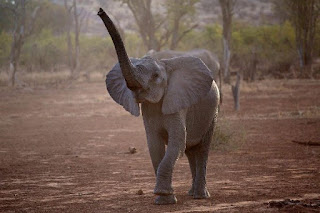Moving giants conservation initiative
De
beers group progresses
Conservation
initiative in Africa
De
Beers Group announced that the second translocation of elephants from its
Venetia Limpopo Nature Reserve (VLNR) in South Africa to Zinave National Park
in Mozambique has taken place.
The
first herds of elephants were corralled at the VLNR on 25 June, before making
their journey by road some 1,700km where they were released at Zinave on 27
June. The final herds arrived at Zinave today, bringing the total number of
elephants moved in 2019 to 53.
The
translocation is part of a major conservation effort – known as ‘Moving Giants’
– that aims to move some 200 elephants over three years in a bid to help secure
the future of the VLNR, which at the beginning of last year was under threat
due to too many elephants impacting the broader ecosystem, and to help
repopulate Mozambique’s elephant population.
During
the first phase of the project, 48 elephants were trans located in July and
August 2018. These elephants, moved in family groups, consisted of matriarchs,
younger males and females, and calves. Those elephants have been seen
integrating with other herds at Zinave and have been thriving with more space
and food now available to them. The remaining elephants at the VLNR are
expected to be moved to national parks in Mozambique with sufficient elephant
carrying capacity from next year.
De
Beers Group is partnering with Peace Parks Foundation (Peace Parks), a leading
not-for-profit transfrontier conservation organisation whose aim is to
re-establish, renew and preserve large functional ecosystems, and Conservation
Solutions – world-leading experts in wildlife management whose team manage the
challenging logistics and veterinary care of the elephants throughout the
process. Peace Parks co-manage Zinave National Park with the Mozambique
government and have ongoing responsibility for the wellbeing of the elephants,
ensuring they continue to thrive in their new environment.
Speaking
from the VLNR during the second capture, Mpumi Zikalala, Managing Director, De
Beers Group Managed Operations, said: “I was lucky enough to witness the most
incredible situation play out in front of me. A family of elephants were
sedated, then the team on the ground had to move quickly to load the elephants
safely into the waiting trucks. It’s amazing to think that within two days’ of
this happening they will arrive at their new home. It’s a very special
privilege to witness first hand a conservation effort that will help secure the
future for these elephants, and their future offspring, for generations to
come.”
Bruce
Cleaver, CEO, De Beers Group, said: “To be part of a conservation effort that will
rehabilitate a national park in Mozambique and at the same time ensure that
other species at one of our nature reserves in South Africa can flourish makes
me feel very proud. Our commitment to protecting the natural world is something
that all of us at De Beers Group feel very strongly about. In recovering
diamonds – nature’s treasure – we need to treasure nature, and that is what
this endeavour is all about.”
Werner
Myburgh, CEO, Peace Parks Foundation, said: “The future of the African elephant
is bleak in most parts of Africa, except for the southern Africa region where
the outlook on their population numbers are stable and even, in some cases,
increasing. Zinave National Park in Mozambique is one of these places and
brings hope as a new founder population is on the rise.
A
rare new beginning in today's day and age, where there is space and safety for
these gentle giants. Thank you to our donors, De Beers Group in particular, and
to our co-management partners ANAC, for helping to restore tomorrow.”
De
Beers Group is backing up its investment in the elephant translocation
initiative by providing Peace Parks with a further US$500K investment from the
Anglo American Foundation to enhance and extend anti-poaching support measures.
At Zinave, 25 new field rangers have been trained and employed from local
communities, an operational aircraft has been purchased for aerial
surveillance, and a digital radio network has been installed. An Anti-Poaching
Operations Control Room has also been established to coordinate efforts to
prevent poaching throughout the park.
Peace
Parks has been working with local communities to ensure that the introduction
of the elephants to the park has a positive impact for their human neighbours.
In Mozambique, 20 per cent of a national park’s revenue is granted to local
communities and is managed through District and sub-District management
structures.
In
addition to increasing employment in the region, the project has invested in
community agriculture, bee keeping and water system improvements to date. It is
also hoped that as the park is rehabilitated it will attract more tourists to
the area, increasing revenues and creating further employment opportunities.







Comments
Post a Comment